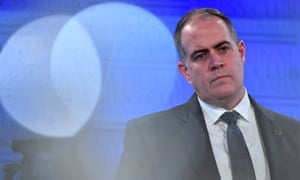David Anderson says the ABC is costing the government half as much as in the mid-1990s
The ABC costs the commonwealth half as much as it did in the
mid-1990s, managing director David Anderson has said, in a rejection of
the prime minister’s claim that ABC funding is increasing every year.
“In 2018/19, expenditure on the ABC represented around 0.2% of all commonwealth government spending,” Anderson told the National Press Club. “In the mid-1990s the level was around 0.4% – twice as much proportionally as today.”
Anderson said that despite receiving less funding the ABC was doing more across more platforms than ever before.
“The ABC is currently undergoing one of the biggest transformations
in its 88-year history,” he said. “Its first wireless radio broadcast
back in July 1932 was estimated to have reached 6% of Australia’s
population. Today the ABC reaches 90% of the population each year.”“In 2018/19, expenditure on the ABC represented around 0.2% of all commonwealth government spending,” Anderson told the National Press Club. “In the mid-1990s the level was around 0.4% – twice as much proportionally as today.”
Anderson said that despite receiving less funding the ABC was doing more across more platforms than ever before.
Anderson said the ABC did not have more than $1bn to spend each year as has been claimed by the government and rightwing critics. Once fixed transmission costs were removed it left $880m of operational funding to spend across all its services after the indexation freeze.
“From the 7pm news bulletin, news online, Four Corners, to local radio across 48 regional locations and capital cities, to dramas like Mystery Road,” he said. “From the sounds of Australia on Triple J, classic, RN, to iconic children’s content like Bluey. All of it.”
After the ABC responded to the Coalition’s budget cuts by announcing staff cuts and cuts to services last month, the prime minister said there were “no cuts” to the ABC’s funding and it was “increasing every year”.
“The ABC would be the only media company or organisation in Australia today whose revenue – their funding – is increasing,” Scott Morrison said.
In May, a Per Capita report found that the ABC had lost $783m in funding since the Coalition came to power. According to the budget papers, the government saved $84m on ABC funding between 2019 and 2022.
Anderson addressed the dispute, referring to “broad public commentary about the cost of the ABC”.
“It is often mentioned that the ABC’s budget is over a billion dollars per year,” he said. “This is a significant investment from the taxpayer for which we provide great value in return.
“To break the budget down, roughly $185m is spent annually on transmission and distribution. This includes long-term contracts with third parties that stretch out to 2035.”
Anderson’s comments backed up those from his chair, Ita Buttrose, who earlier had publicly refuted Morrison and clarified that indexation freezes amounted to an $83m reduction over three years.
Anderson called for the ABC triennial funding model to be changed to a five-year funding cycle.
“We believe a five-year funding cycle would take the ABC out of the politics of the three-year federal electoral cycle and further safeguard its independence,” he said.
“Longer term planning is required for the task of modernising the ABC, which includes shifting our focus towards on-demand programming, while maintaining our high editorial standards.”
In making its cuts, ABC News chose to axe the 7.45am radio bulletin because it does not align with its on-demand and digital focus.
Anderson said the decline in public confidence in democratic institutions and the rise of more extreme voices meant the ABC was more important than ever.
“In a complex and uncertain world, the ABC is consistently rated as Australia’s most trusted media organisation,” he said. “This is something we are determined to maintain.
“We are a force for social cohesion today. And looking ahead, the ABC’s positive and unifying role in Australian life will become more important than ever.”
The ABC also flagged it would be asking audiences to sign into one ABC account across all the platforms so more targeted services could be offered.

No comments:
Post a Comment